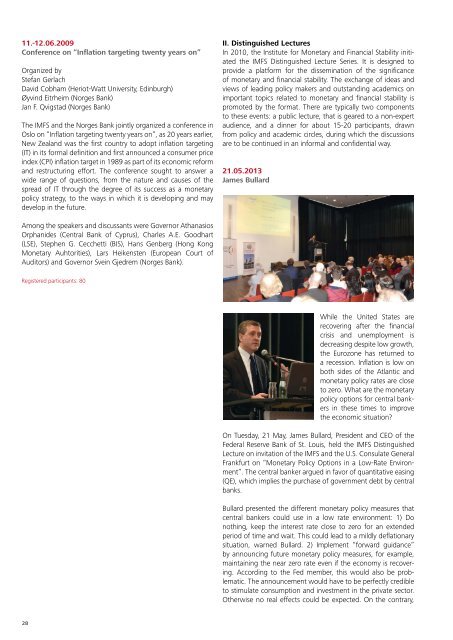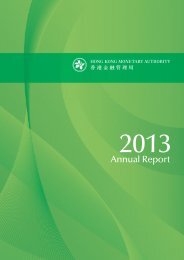IMFS_2009_to_2013_web
IMFS_2009_to_2013_web
IMFS_2009_to_2013_web
You also want an ePaper? Increase the reach of your titles
YUMPU automatically turns print PDFs into web optimized ePapers that Google loves.
11.-12.06.<strong>2009</strong><br />
Conference on “Inflation targeting twenty years on”<br />
Organized by<br />
Stefan Gerlach<br />
David Cobham (Heriot-Watt University, Edinburgh)<br />
Øyvind Eitrheim (Norges Bank)<br />
Jan F. Qvigstad (Norges Bank)<br />
The <strong>IMFS</strong> and the Norges Bank jointly organized a conference in<br />
Oslo on “Inflation targeting twenty years on”, as 20 years earlier,<br />
New Zealand was the first country <strong>to</strong> adopt inflation targeting<br />
(IT) in its formal definition and first announced a consumer price<br />
index (CPI) inflation target in 1989 as part of its economic reform<br />
and restructuring effort. The conference sought <strong>to</strong> answer a<br />
wide range of questions, from the nature and causes of the<br />
spread of IT through the degree of its success as a monetary<br />
policy strategy, <strong>to</strong> the ways in which it is developing and may<br />
develop in the future.<br />
II. Distinguished Lectures<br />
In 2010, the Institute for Monetary and Financial Stability initiated<br />
the <strong>IMFS</strong> Distinguished Lecture Series. It is designed <strong>to</strong><br />
provide a platform for the dissemination of the significance<br />
of monetary and financial stability. The exchange of ideas and<br />
views of leading policy makers and outstanding academics on<br />
important <strong>to</strong>pics related <strong>to</strong> monetary and financial stability is<br />
promoted by the format. There are typically two components<br />
<strong>to</strong> these events: a public lecture, that is geared <strong>to</strong> a non-expert<br />
audience, and a dinner for about 15-20 participants, drawn<br />
from policy and academic circles, during which the discussions<br />
are <strong>to</strong> be continued in an informal and confidential way.<br />
21.05.<strong>2013</strong><br />
James Bullard<br />
Among the speakers and discussants were Governor Athanasios<br />
Orphanides (Central Bank of Cyprus), Charles A.E. Goodhart<br />
(LSE), Stephen G. Cecchetti (BIS), Hans Genberg (Hong Kong<br />
Monetary Auh<strong>to</strong>rities), Lars Heikensten (European Court of<br />
Audi<strong>to</strong>rs) and Governor Svein Gjedrem (Norges Bank).<br />
Registered participants: 80<br />
While the United States are<br />
recovering after the financial<br />
crisis and unemployment is<br />
decreasing despite low growth,<br />
the Eurozone has returned <strong>to</strong><br />
a recession. Inflation is low on<br />
both sides of the Atlantic and<br />
monetary policy rates are close<br />
<strong>to</strong> zero. What are the monetary<br />
policy options for central bankers<br />
in these times <strong>to</strong> improve<br />
the economic situation<br />
On Tuesday, 21 May, James Bullard, President and CEO of the<br />
Federal Reserve Bank of St. Louis, held the <strong>IMFS</strong> Distinguished<br />
Lecture on invitation of the <strong>IMFS</strong> and the U.S. Consulate General<br />
Frankfurt on “Monetary Policy Options in a Low-Rate Environment”.<br />
The central banker argued in favor of quantitative easing<br />
(QE), which implies the purchase of government debt by central<br />
banks.<br />
Bullard presented the different monetary policy measures that<br />
central bankers could use in a low rate environment: 1) Do<br />
nothing, keep the interest rate close <strong>to</strong> zero for an extended<br />
period of time and wait. This could lead <strong>to</strong> a mildly deflationary<br />
situation, warned Bullard. 2) Implement “forward guidance”<br />
by announcing future monetary policy measures, for example,<br />
maintaining the near zero rate even if the economy is recovering.<br />
According <strong>to</strong> the Fed member, this would also be problematic.<br />
The announcement would have <strong>to</strong> be perfectly credible<br />
<strong>to</strong> stimulate consumption and investment in the private sec<strong>to</strong>r.<br />
Otherwise no real effects could be expected. On the contrary,<br />
28



